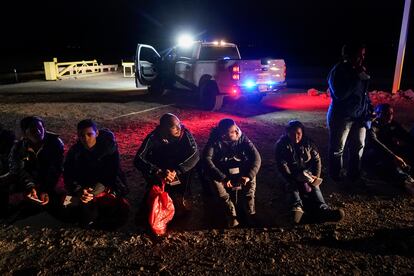
Washington on Tuesday released the outlines of a plan aimed at reducing the influx of illegal immigrants into the United States. President Joe Biden’s administration is tightening border management by imposing limits on citizens of other countries coming to the United States seeking asylum. Only those who request it from their countries of origin or transit may do so in accordance with the requirements set forth by the administration beginning in 2023. The Democratic president’s plan is expected to remain in place for two years. Since the following March, it has generated more criticism from human rights organizations.
The Size, jointly announced Tuesday by the Departments of Homeland Security and Justice, aims to encourage tens of thousands of immigrants to “take a legal path or seek asylum or protection in the countries they travel to.” Failure to do so will result in the individuals not being allowed to enter the country, the administration said. The initiative, which argues that it aims to reduce migrants’ dependence on human-smuggling gangs and slow the flow of people arriving at the border with Mexico, has been a point of contention for Biden in the election.
“We are strengthening a safe, orderly and legal path for them to reach the United States, and at the same time, we are proposing new consequences for those who do not seek the processes offered by the country and its allies. In the region,” he said. Alejandro Mayorgas, the administration’s head of internal security, made the assurance in a statement on Tuesday.
In January, Customs and Border Protection (CBP) introduced an application that receives all asylum claims from citizens seeking to enter the country, the official said. A digital form must be filled in the countries of origin before embarking on the journey to the North. President Biden later clarified that if denied entry or tried to travel illegally, people would be returned to Mexico and unable to participate in the program again. They will also be barred from entering the United States for five years.
The plan, which would underline the “rebuttable presumption” for asylum seekers, was tentatively made public this Tuesday when it was published in the government’s official gazette. Over the next 30 days, we will be able to solicit comments from various agencies responsible for implementing US immigration policy and from the public.
The move also becomes a tool to limit the flow of migration to Washington, which on May 11 will end Title 42, which has allowed the rapid departure of more than two million people (thousands of them asylum seekers). He came to the border during the health crisis.
Join EL PAÍS to follow all the news and read without limits.
Register
However, the provision already has many critics, who consider it a total veto of the right to asylum. One of them is the famous Union for Civil Rights (ACLU). “President Biden’s proposal would put vulnerable populations at risk and deny protection to thousands more,” the organization said, branding it a new attack on the rights to seek safety and security in the United States. Welcomes those persecuted in other countries.
Amnesty International’s Washington office is following the same path. The human rights organization believes that the proposal “undermines the human right to asylum”. “This new veto on asylum will deny protection to anyone who has not applied for asylum when transiting through third countries,” it said in a statement. Amnesty compared Biden’s move to similar bans the Trump administration wanted to implement in 2019, but was unable to do so after a federal appeals court blocked it from doing so. The ACLU has threatened legal action if Biden goes ahead with his plan.
The administration has taken some measures to discourage regional migration. In January, it imposed restrictions on people from Venezuela, Cuba, Haiti and Nicaragua trying to come. Following the January 5 announcement, the average weekly visit went from 1,200 citizens of those countries to just 35 by the end of the month, a 97% drop. “Encounters (apprehensions) remained very low throughout February,” says Homeland Security. Instead, the department said 26,000 were given the green light. Nearly 34,000 Venezuelans have come to the U.S. since October 2022, when the plan to move north began.
Follow all international information Facebook And Twitteror inside Our weekly newsletter.





